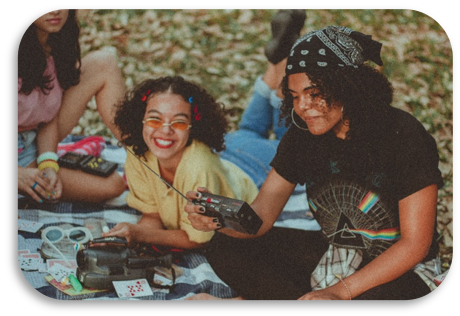NFE in sport
NFE – show me your real face!
INTERACTION
The keyword in all non-formal education methods is no other than…INTERACTION! NFE cannot be a one-way journey, as it requires the active participation and involvement of all people involved – trainers, facilitators, participants. There is no room for plain observation, neither is there any level of passive listening in this process. NFE is based and adjusted to the needs and desires of the participants who shall be engaged and involved in all stages of the process; therefore, interaction is never a missing component. Teamwork, physical activity, openly expressing one’s opinion, sharing and debating, is an integral part of this “living organism”, that is shaped by the attitudes, relations and behaviors of the people involved in it. The most beneficial outcome of this process which opposes itself against the passive and dry methods of formal education is that participants upscale their social skills and become more outgoing and open to others.

INTEGRATED LEARNING
Integrated learning explores and uses information effectively, enabling participants to integrate ideas and experiences and apply them to formulate new learning situations. As a result, integrated learning of non-formal education methods involves the enhancement of creativity, adaptability, critical reasoning, and collaboration as the key features of this process.

CREATIVITY
It is generally accepted that creativity wakes up the intrinsic motivation to learn, as when someone is focused on a certain goal they engage more to the learning process and are eager to fulfill the task and accomplish it. And…as a fact, non-formal education is directly linked with creativity, as participants discover new ways to solve a task and are guided to look into a topic or deliver something concrete through an unusual and new perspective. The creative non-formal education methods have the power to improve the mood, boost self-esteem, enhance cognitive function, alleviate stress and anxiety, and of course…improve social skills!
FUN
Full of passion and fun, non-formal learning provides an excellent opportunity to learn through activities that are very enjoyable, highly emotional and based on active participation and involvement. It brings people closer and it feels as a very natural way of learning. At the end of the day…it leaves an unforgettable taste of a unique learning experience!
RELAXED ENVIRONMENT
Traditionally learning has been viewed as a ‘classroom’ activity that takes place in established, structured and formally organized settings. However, it is widely accepted that there is valuable learning to be achieved outside these environments, hence, contrary to typical formal education practices, NFE offers participants a quite different setting. Non-formal learning takes place outside formal learning environments, though within some kind of organizational framework. For some participants, this can offer an environment that is more welcoming and more prone to let them get really engaged with a topic, to feel comfortable to express themselves, relax and open up.

LEARNER-CENTERED
In NFE emphasis is put on learning rather than on teaching. The learner participates in determining the educational objectives and exerts substantial control over the content and the methods to be applied, leading to the fostering of attitudes of self-awareness and the power to control the environment. Apart from that, what is learned by the participants is relevant to their life as learners, as well as to the needs of society, however, it is always appropriate to the level of the learner’s development, with new content and experiences being introduced when the learner is ready to share. As a result, non-formal education ends up being a much more flexible learning method comparing to the formal education approach, which is regulated by definition.

Does this all sound a little familiar? But of course! Sports and non-formal education approaches are sharing a lot of common features and this is the reason why they can so harmonically support one another. However, these similarities do not only refer to the learning process itself but can also be found in the key-actors of this process. Facilitators and trainers in NFE practices often include sport activities in their learning flow, while coaches, trainers and sports mentors apply NFE methods – even without realizing it on some occasions! In fact, their roles are quite interlined and lying under the umbrella of the “training process”.
Speaking of, even though no general definition for “training” exists, it can refer to a variety of processes and actions depending on the context in which it takes place and on the aims and values of its providers, though certain features and general elements can be applicable to any training.
